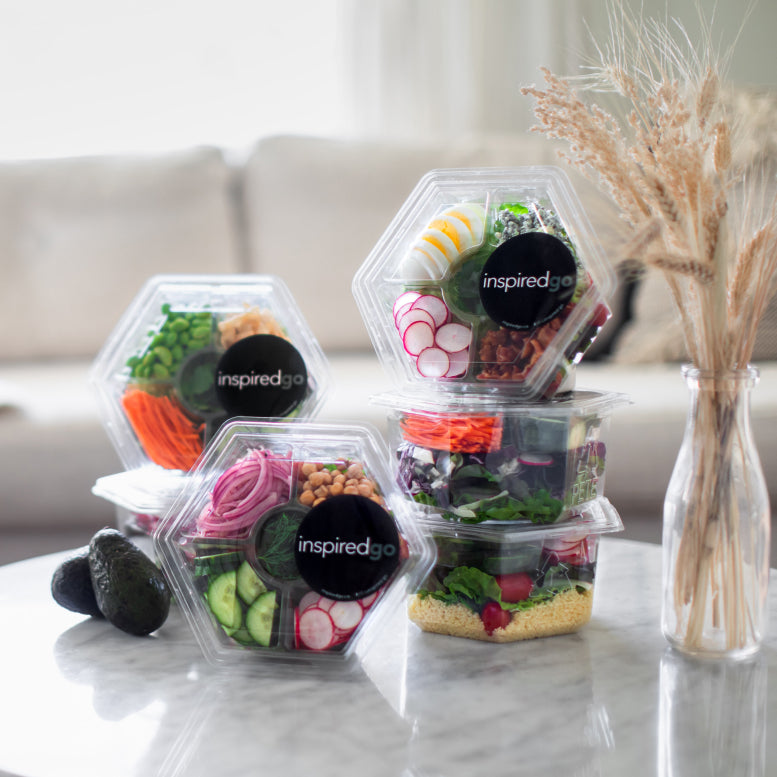How Many Calories In Chicken And Salad?
Table of Contents
1. Caloric Content of Chicken and Salad Meals
2. Is Salad Good for You?
3. How Many Calories in Chicken and Salad?
4. How Many Calories Are in a Taco Salad?
1. Caloric Content of Chicken and Salad Meals
The caloric content of a meal involving chicken and salad can vary significantly depending on the exact ingredients and preparation methods used. However, as an approximation, a skinless, grilled chicken breast that weighs around 100 grams contains approximately 165 calories. A mixed green salad with a variety of vegetables but without any dressing typically has about 50 calories per two-cup serving. Adding dressings or extra toppings will increase the total caloric content. Please note, the meals offered by various food providers, like Inspired Go, may have different calorie counts based on their unique recipes and portion sizes. Always check the nutrition information provided for the most accurate data.
Order fresh salads today →


2. Is Salad Good for You?
Salads are among the healthiest meal choices, offering a wide variety of essential nutrients in every bite. Packed with leafy greens, colorful vegetables, lean proteins, and healthy fats, salads provide vitamins, minerals, and antioxidants crucial for overall health. They are naturally high in fiber, which supports digestion and promotes feelings of fullness, reducing the likelihood of overeating. Salads can also be customized to include protein-rich ingredients like grilled chicken, chickpeas, or tofu, making them balanced and satisfying. Dressing choices play a significant role in salad healthiness, with olive oil-based or yogurt-based dressings offering healthier alternatives. Salad delivery services simplify incorporating these nutritious meals into daily life, ensuring consistent access to fresh, wholesome ingredients without extensive preparation.
Choose your salads and schedule delivery →
3. How Many Calories in Chicken and Salad?
Chicken salads are a popular meal option, combining lean protein with fresh vegetables for a balanced, satisfying dish. The calorie count in a chicken salad depends on factors like chicken preparation, dressing choice, and additional toppings. Grilled chicken typically adds fewer calories compared to fried or breaded chicken. A standard grilled chicken salad usually contains between 300–500 calories, while creamier dressings and fried chicken can push calorie counts higher. Salad delivery services provide clear nutritional information, allowing customers to make informed choices about their orders. With options to customize salads—such as choosing low-calorie dressings or extra vegetables—customers can easily tailor their meals to fit their dietary goals.
Get fresh salads and snacks delivered →
4. How Many Calories Are in a Taco Salad?
Taco salads are a popular fusion of fresh greens and bold Mexican flavors, offering a satisfying mix of crunchy textures, zesty dressings, and hearty toppings. However, traditional taco salads can vary significantly in calorie content, depending on ingredients like fried tortilla shells, heavy dressings, and excess cheese. Finding a delicious yet balanced version can be a challenge for those looking to maintain a mindful diet. Inspired Go’s Chipotle Taco Salad delivers the perfect harmony of flavor and nutrition, offering 390 calories, 15g of protein, and 4g of fiber per serving. Designed for maximum freshness and enjoyment, this salad features a crisp blend of red peppers, black beans, corn, Monterey Jack and cheddar cheese, and pickled onions. The house-made Greek yogurt chipotle lime dressing adds a creamy, tangy kick while keeping the calorie count in check.
Try our fresh, ready-to-eat salads →
Frequently Asked Questions
The most nutritious salad greens are dark leafy varieties like spinach, kale, and arugula. These greens are packed with essential vitamins, including A, C, and K, as well as minerals like calcium and iron. Kale is particularly rich in antioxidants, while spinach offers significant amounts of folate and magnesium. Choosing a mix of dark greens enhances both the flavor and nutritional value of your salad.
A healthy salad includes a balance of nutrient-dense ingredients like leafy greens, fresh vegetables, lean proteins, and healthy fats. For example, a base of spinach and kale, paired with grilled chicken, cherry tomatoes, avocado, and a light olive oil dressing, creates a wholesome meal. Avoid fried toppings or sugary dressings, as they add empty calories, and opt for natural ingredients to maximize nutrition.
Yes, eating salad daily is a healthy habit when it includes a variety of fresh, nutrient-rich ingredients. Salads offer fiber for digestion, antioxidants for immunity, and essential nutrients like potassium and folate. Regularly eating salads can support weight management and improve energy levels. To avoid monotony, vary your greens, proteins, and toppings to keep meals satisfying and nutritionally balanced.
Healthy salad dressings are typically made with simple, natural ingredients. Olive oil-based dressings, paired with balsamic vinegar or fresh lemon juice, provide healthy fats and enhance flavor without unnecessary calories. Avoid store-bought dressings with high sugar or preservatives. For a creamy alternative, opt for homemade dressings using Greek yogurt or avocado for added nutritional benefits.
Yes, salads are incredibly beneficial for overall health when prepared with fresh, whole ingredients. They are low in calories and high in vitamins, minerals, and antioxidants, supporting heart health, digestion, and immunity. Adding a mix of proteins and healthy fats creates a satisfying, nutrient-dense meal. Regularly incorporating salads into your diet can promote long-term well-being and energy.

